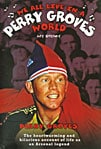 My Story
My Story
by Perry Groves with John McShane
John Blake, £17.99
Reviewed by Jon Spurling
From WSC 240 February 2007
As Arsenal’s new age breed of teetotal, sinewy robots dazzle opponents with the speed and accuracy of their passing game, George Graham’s functional but highly successful collection of home-grown Englishmen and rising lower-league stars belong to a bygone era. In the 14 years since his departure from Highbury, Groves, a £75,000 snip from Colchester, has been granted cult-figure status. In the (frequent) long silences at home games, the “We all live in a Perry Groves world” chant – sung to the tune of Yellow Submarine – is occasionally aired, and there are two websites dedicated to Graham’s first Arsenal signing. In recent weeks, there has been a concerted campaign by numerous Arsenal sites to ensure that Groves’ tome outsells Ashley Cole’s autobiography; a battle which is being won fairly comfortably.
With fleshy white thighs, painfully tight shorts, a Tin Tin quiff, distinctly blue-collar skills and a penchant for necking pints of lager, Groves was an archetypal Eighties footballer. Much of the book’s content is also a throwback to a less enlightened age, with reconstructed male attitudes in scant evidence. His attitude to women (“I was at it morning, noon and night. You could say I was a sex addict, although I think all this addiction thing is bollocks”) is distinctly old school, and his feelings towards the drinking culture at Highbury in the late Eighties (“Merse and Rodders were binge drinkers, not alcoholics”) misguided at best.
Groves does a decent line in self-deprecating humour, as he recounts tales of how his ramshackle car lurched into the Gunners’ London Colney training ground on his first day as an Arsenal player, and promptly blew up, as a clutch of Mercedes/BMW driving internationals looked on in bewilderment, and his consternation at mistakenly being called “Terry Grouse” by a tabloid after his Colchester debut is pure knock-about humour. There are also some priceless George Graham moments (the Scot forced his players to wear blazers and ties in searing Australian heat with the comment “We are the Arsenal – remember that”) and Paul Merson, frequently Groves’s partner in crime, emerges as plain thick, after walking into the wrong toilet because “he didn’t know what male and female meant”.
At times, Groves goes too far – or at least shows little remorse for having done so. His ticket-touting prior to the 1987 Littlewoods Cup final pocketed Gunners players around £2,000 each at the expense of loyal fans, and his admission that he laughed at a tearful David Seaman after Arsenal lost the 1991 FA Cup semi-final to Spurs has drawn stinging criticism from former team-mates, who accused him of betraying dressing-room solidarity. You’re left to wonder what else Groves might have achieved in the game if he’d abstained more (“Imagine how fit you’d all be if you didn’t drink,” said Anders Limpar) and steered clear of injury.
There’s a small-town mentality to the book (much of it is set in Colchester) which occasionally gives it a tacky feel. But Groves’s story is the literary equivalent of a Carry On film; despite its hackneyed feel and cringe-worthy moments, you end up laughing guiltily, at parts of it anyway.